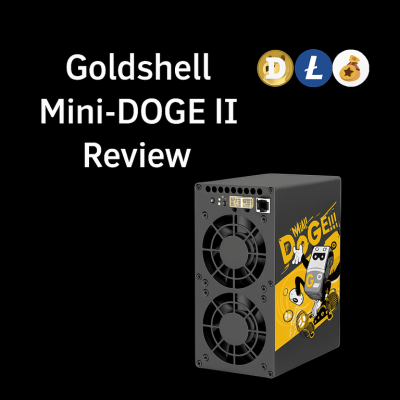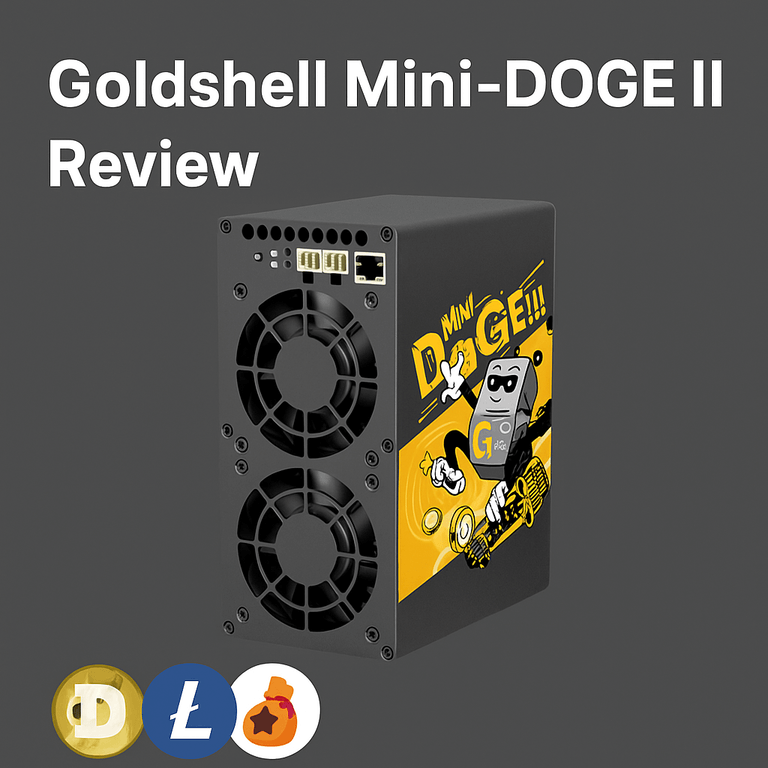Goldshell Mini‑DOGE II Review
Goldshell Mini-DOGE II is an apartment-friendly Scrypt miner for LTC + DOGE. It runs 420 or 335 MH/s at 400 or 260 W with up to about 35 dB. This review explains setup, merged mining, power cost, and price ranges.

Pros:
- Dual‑mode flexibility: 420 MH/s @ 400 W or 335 MH/s @ 260 W — pick throughput or efficiency.
- Home‑friendly noise: listed ≤ 35 dB — comparable to a quiet office.
- Merged mining support for Litecoin and Dogecoin via Scrypt pools.
- Simple web UI and easy onboarding; compact, reliable form‑factor.
Cons:
- Not ROI‑focused; treat it as a hobby/learning device that can stack LTC/DOGE.
- Ethernet‑only officially (no built‑in Wi‑Fi); some sellers mention Wi‑Fi via adapters — confirm before buying.
- Includes/omits PSU depending on seller; check voltage/connector and regional plug type.
If you want heater‑like warmth alongside mining in a similar size class, compare with our Avalon Nano 3S review (SHA‑256, 140 W). For ultra‑low‑power learning on SHA‑256, see Bitaxe Gamma. Browse all Scrypt reviews
Key Takeaways
- Dual modes: 420 MH/s @ 400 W or 335 MH/s @ 260 W.
- Noise: ≤ 35 dB (roughly a quiet office).
- Efficiency examples: 400 W / 420 MH ≈ ~0.95 J/MH; 260 W / 335 MH ≈ ~0.78 J/MH (lower is better).
- Merged mining: mine LTC + DOGE simultaneously on Scrypt pools.
- Networking: Ethernet (RJ45); if you need Wi‑Fi, use a small Ethernet bridge.
Technical Specifications

| Item | Spec |
|---|---|
| Algorithm | Scrypt (LTC, DOGE) |
| Hashrate (Hashrate mode) | 420 MH/s |
| Power (Hashrate mode) | 400 W @ wall |
| Hashrate (Low‑Power mode) | 335 MH/s |
| Power (Low‑Power mode) | 260 W @ wall |
| Noise (typical) | ≤ 35 dB |
| Networking | Ethernet (RJ45); web interface (no built‑in Wi‑Fi) |
| Dimensions / Weight | ~178 × 150 × 84 mm; ~2.3 kg |
| Input voltage | 100–240 V AC (external PSU; check bundle) |
Plain‑English examples: 420 MH/s ≈ 420 million Scrypt hashes per second. 400 W is like a compact desktop PC under load. 35 dB is a soft “office whoosh.”
Performance, Noise & Heat
In Hashrate mode, expect ~420 MH/s at ~400 W after warm‑up. Low‑Power brings ~335 MH/s at ~260 W — quieter and cooler. Noise is rated ≤ 35 dB, but tone changes with room acoustics and surface. Place the miner on a hard, open surface and keep the rear exhaust unobstructed.
Heat output (rule‑of‑thumb)
1 W ≈ 3.412 BTU/h →
400 W ≈ 1,365 BTU/h (Hashrate mode) • 260 W ≈ 887 BTU/h (Low‑Power).
These levels warm the area nearby but won’t replace a room heater.
Electricity cost examples (24 h, continuous)
- Hashrate mode (400 W):
€0.10/kWh → ~€0.96/day (~€28.8/month)
€0.20/kWh → ~€1.92/day (~€57.6/month)
€0.30/kWh → ~€2.88/day (~€86.4/month) - Low‑Power mode (260 W):
€0.10/kWh → ~€0.62/day (~€18.7/month)
€0.20/kWh → ~€1.25/day (~€37.4/month)
€0.30/kWh → ~€1.87/day (~€56.2/month)
Formula: kWh = (Watts ÷ 1000) × hours — In winter, some portion becomes useful heat, partly offsetting heating costs.
Setup & Pooling (quick start)
- Unbox & place: keep the rear exhaust clear; avoid cabinets/fabric.
- Network: connect Ethernet (RJ45) to your router/switch. If cable is impossible, use a Wi‑Fi‑to‑Ethernet bridge.
- Power: verify PSU included; if not, use a quality 100–240 V AC→DC adapter for the Mini‑DOGE II. Short, thick cables reduce voltage drop.
- Web interface: open the device IP in your browser; set pool URL, wallet address, and worker. Example Scrypt pool string:
stratum+tcp://litecoinpool.org:3333
Username: your LTC address (e.g.,ltc1...) or pool account
Password:x(or as required). - Mode selection: start with Low‑Power for quieter/cheaper running; switch to Hashrate if you want more LTC+DOGE throughput.
- Verify: after 5–10 minutes, hashrate stabilizes. Watch Rejected/Stale shares; if they rise, improve network quality.
Plain tips: short Ethernet run, solid PSU, and open airflow keep stales and temps low. Avoid power strips with many high‑draw devices.
Who Should Buy the Mini‑DOGE II?
- Home/apartment users who want LTC + DOGE merged mining in a quiet, compact device.
- Beginners who prefer a ready‑made miner with simple web setup.
- Tinkerers who like switching between efficiency and throughput modes.
Skip it if you need industrial hashrate or extreme warmth; see the Alternatives below for larger Scrypt miners.
Alternatives & Comparisons
Explore more devices on our Scrypt reviews index
| Product | Hashrate (typ.) | Power • Efficiency • Notes |
|---|---|---|
| Goldshell Mini‑DOGE II | 420 MH/s (335 MH/s LP) | 400 W • ~0.95 J/MH (LP: 260 W • ~0.78 J/MH) • ≤ 35 dB • Ethernet |
| Goldshell Mini‑DOGE III | 700–810 MH/s | 400–500 W • ~0.62–0.71 J/MH • more airflow/noise • Ethernet |
| Goldshell Mini‑DOGE Pro / Mini‑DOGE (Gen1) | 205–185 MH/s | 220–233 W • ~1.1–1.26 J/MH • older, quieter |
| Goldshell LT‑Lite (not desk‑quiet) | 1.6 GH/s | ~1450 W • ~0.9 J/MH • loud; not apartment‑friendly |
| Antminer L7 (reference only) | 9.5–9.16 GH/s | ~3.2–3.4 kW • ~0.34–0.37 J/MH • not home‑friendly |
Related internal links
- All Scrypt reviews
- All reviews
Verdict
The Mini‑DOGE II nails the home Scrypt niche: dual‑mode, quiet (≤ 35 dB), and easy to run 24/7. Treat it as a plug‑and‑play LTC+DOGE miner with real flexibility between efficiency and throughput. If you need more hashrate, step up to Mini‑DOGE III or rack‑class Scrypt miners — but plan for more noise and power.
FAQ's
Is Mini‑DOGE II profitable?
At typical home tariffs, think learning + steady sats (via pool) rather than pure ROI.
Does it support Wi‑Fi? Officially Ethernet‑only
some listings bundle USB Wi‑Fi or bridges. Confirm before buying.
How loud is it?
Listed ≤ 35 dB; placement and surfaces change perceived tone.
Does it include a PSU?
Depends on seller. Verify PSU voltage/connector and regional plug type.
Can I solo‑mine DOGE/LTC?
You can, but pools are more predictable. For merged mining, use reputable Scrypt pools.
